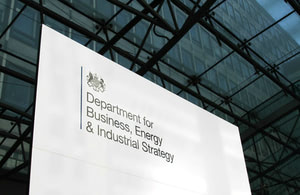The Department for Business, Energy and Industrial Strategy (BEIS) will have a key role in delivering the pledges set out in the 2020 Budget

@BEISGovUK in the 2020 Budget
The government has delivered a Budget aimed at levelling up the UK’s nations and regions, while tackling the present threat of coronavirus to the UK economy. The Department for Business, Energy and Industrial Strategy (BEIS) will have a key role to play delivering these pledges.
Support for businesses affected by coronavirus
The UK is well prepared to tackle COVID-19. However, it is essential the government supports businesses through this disruptive period. That is why, in his Budget statement on Wednesday 11 March, the Chancellor announced a £12 billion package for public services, individuals and businesses whose finances are affected.
This includes:
- a Coronavirus Business Interruption Loan Scheme, delivered by the British Business Bank, which will enable businesses to apply for loans of up to £1.2 million
- providing local authorities with up to £2.2 billion to deliver grants of up to £3,000 to around 700,000 small businesses that experience increased costs
- refunding businesses with fewer than 250 employees the costs of up to 14 days of eligible statutory sick pay per employee who is self-isolating
- temporarily increasing the business rates retail discount in England to 100%, meaning shops, pubs, restaurants, takeaways and bars with a rateable value below £51,000 will not pay a penny of business rates
Growing the UK’s reputation as a science superpower
The UK is a science superpower, with less than 1% of the world’s population, but with 4 of the top 20 universities and more than 4% of the world’s researchers. The government has committed to increasing research and development (R&D) investment to £22 billion per year to 2025, marking the largest and fastest ever expansion for UK research.
In the Budget, the government has committed to invest:
- over £900 million to ensure UK businesses are leading the way in high-potential technologies including nuclear fusion, space and electric vehicles
- £800 million to support a new high risk, high reward funding agency
- up to £400 million for world-leading research, infrastructure and equipment across the UK
- £300 million extra for mathematical PhDs, fellowships and research projects
- £80 million for specialist institutions to fund research and wider knowledge exchange activities
- £22 million to support research and innovation across the UK’s steel industry
Making the UK the best place in the world to work and grow a business
The government is committed to making the UK the best place in the world to work, start and grow a business. New measures will ensure that as the economy grows and changes, our business environment protects workers while giving firms the tools to turn ideas into reality.
The government has committed to:
- creating an entitlement of up to 12 weeks paid neonatal leave for employees whose babies have spent an extended period of time in neonatal care
- consulting on the design of a new carers leave entitlement
- investing £10 million to increase the capacity of growth hubs, providing high quality business support in England
- launching the Reforming Regulation Initiative to allow businesses to contribute to the reform of regulation and the £10 million for the second round of the Regulators’ Pioneer Fund
- ensuring digital platform markets work for our disruptors, consumers and small and medium-sized enterprises (SMEs) by accepting all 6 of the Furman Review’s recommendations and establishing a cross-regulator taskforce
Ending our contribution to climate change
Our mission is to deliver clean energy and lead on the path to net zero emissions by 2050. Since 2010, the UK has cut its carbon dioxide emissions by around 30%, but to end our contribution to climate change entirely we will need to make the most of ideas, innovations and solutions from each corner of the UK.
In the Budget, the government committed to:
- investing at least £800 million in Carbon Capture and Storage (CCS) infrastructure to support the decarbonisation of our power and industrial sectors
- establishing CCS at 2 industrial sites by the 2030s and construction of the UK’s first CCS power plant
- at least doubling the size of our Energy Innovation Programme to £1 billion to help put the UK at the forefront of low carbon technologies.
Business Secretary Alok Sharma said:
This Budget delivers security today and lays the foundations for prosperity tomorrow, and offers support to businesses dealing with COVID-19.
We are betting big on Britain’s pioneers and problem-solvers as they seek to transform every aspect of our lives: from the journeys we make, to the medicines we take.












Responses